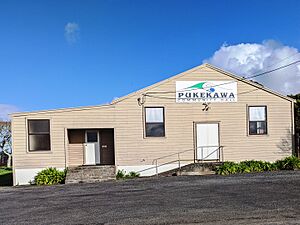Pukekawa facts for kids
Quick facts for kids
Pukekawa
|
|
|---|---|

Pukekawa Hall
|
|
| Country | New Zealand |
| Region | Waikato |
| District | Waikato District |
| Ward | Onewhero-Te Akau Ward |
| Community | Onewhero-Tuakau Community |
| Electorates |
|
| Area | |
| • Total | 7.70 km2 (2.97 sq mi) |
| Population
(2018 Census)
|
|
| • Total | 150 |
| • Density | 19.5/km2 (50.5/sq mi) |
Pukekawa is a small town in the Lower Waikato River area of New Zealand's North Island. It is about 66 kilometers south of central Auckland. The land here is very good for farming. Farmers grow many vegetables like onions, potatoes, and carrots. Until 2010, Pukekawa was part of the Franklin District.
The town has a primary school, which is across from the local garage and store. For more services like supermarkets, banks, and shops, people go to Tuakau, which is about 8 kilometers away. Pukekohe, a busy rural town, is another 10 kilometers further. The Onewhero Golf Club is the main fun activity listed in Pukekawa. The old State Highway 22 used to pass right through Pukekawa.
An old Māori pā (fortress) is on top of Pukekawa hill. But other than that, there are no signs of Māori settlements before Europeans arrived. The name Pukekawa means "bitter hill." This is because the hill was not good for growing kumara (sweet potatoes). In the 1920s, a writer named James Cowan described Pukekawa as a "beautiful round green hill."
Contents
History of Pukekawa
New Zealand Wars in Pukekawa
During the Waikato military campaigns, the Ngāti Maniapoto people used Pukekawa as their main base. From here, they would launch attacks on nearby British settlements. In 1863, they raided and burned down the British army supply depot at Cameron town. A group of British soldiers sent to fight them was defeated. The Māori fighters then hunted the soldiers in the bush through the night.
Peace and Māori Settlement
In the 1880s, the New Zealand Government made a peace agreement. Pukekawa was given back to the Ngāti Maniapoto people. In 1888, the Māori King, Tawhiao, moved to Pukekawa with his followers. By 1892, there were 80 to 90 Māori houses (whare) in Pukekawa. King Tawhiao's own large house stood there.
The Māori settlers grew market garden crops, mainly potatoes and maize. Growing vegetables for sale has been a main activity in Pukekawa ever since.
Horse Racing and Māori Government
By the early 1890s, Pukekawa became famous for its horse racing and betting. Both Māori and Pākehā (Europeans) came to the Pukekawa races. The Pukekawa racing cup offered a prize of twenty pounds, which was much more than other nearby races. King Tawhiao and his Court would make regular trips around the North Island from Pukekawa. King Tawhiao also set up a Māori Government in Pukekawa, but the Crown and the New Zealand Government did not officially recognize it.
The Pukekawa Incident
In 1890, a group of armed soldiers came to Pukekawa. They arrested King Tawhiao's secretary, Kerei, for destroying a surveyor's marker on Pukekawa hill. Kerei was arrested without a fight, which upset King Tawhiao. The King later complained to the New Zealand Government. He said they had broken the peace agreement from the 1880s, when the King's followers had given up their guns. Some people thought this arrest was done for political reasons.
Pākehā Era and Modern Times
After King Tawhiao passed away and land was sold to Pākehā farmers, Pukekawa became a Pākehā rural settlement in the early 1900s. By 1920, it was a typical small town with a Post Office, a store, and a few buildings.
Pukekawa grew with the Waikato region's success. Later, like many rural areas, its population decreased from the 1950s to the 1990s. By 1970, Pukekawa was a wealthy rural community. It was also known for a famous local event that divided the community. A film called Beyond Reasonable Doubt was even made in Pukekawa, with local people helping.
In recent times, Pukekawa has become a popular place for people to build new homes. Houses worth hundreds of thousands or even millions of dollars are being sold. An old Auckland house from the 1850s was even moved and sold in Pukekawa. Real estate agents often talk about the beautiful views of the Waikato River. Farms are being sold or rented to New Zealanders and people from other countries who want to enjoy rural life. There are also places for backpackers to stay. The Thomas family still owns and farms their land.
Pukekawa farming has now returned to market gardening. So, Pukekawa has gone from Māori horticulture (growing plants) to Pākehā dairying (milk farming) and back to horticulture again.
Sweetwaters Music Festivals
In the 1980s, Pukekawa was known for hosting three big rock and pop Sweetwaters Music Festivals on a local farm.
Population Information
The Pukekawa settlement is a small area of about 7.70 square kilometers. In the 2018 New Zealand census, 150 people lived there. This was an increase of 15 people since the 2013 census. There were 51 households, with more males (81) than females (69). The average age was 44.4 years. About 22% of the people were under 15 years old.
Most people (94%) were European/Pākehā. Some people also identified as Māori (18%), Pacific peoples (2%), and Asian (4%). Many people chose not to state their religion. Of those who did, 66% had no religion, and 26% were Christian.
The average income for people aged 15 and over was $35,700. About 56% of people aged 15 and over worked full-time.
Education
Pukekawa School is a school for both boys and girls. It is a state primary school. As of February 2024. , it has 78 students.
 | Isaac Myers |
 | D. Hamilton Jackson |
 | A. Philip Randolph |

